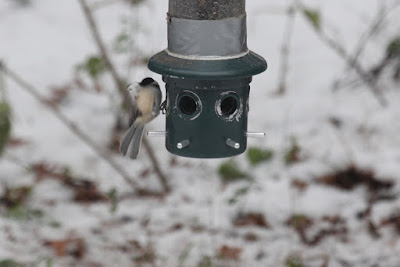- Highlights of the Findings of the U.S. Global Change Research Program Climate Science Special Report (Executive Summary)
- Climate Science Special Report Fourth National Climate Assessment (NCA4), Volume I (Full Report)
There have been several Tweets about that report, but we found mike augustyniak's to be particularly well done.
 |
| "will flit for food"
Photo by J. Harrington
|
Chickadees can only adapt to the changes they're experiencing. We can do better than chickadees. We can modify those of our activities that have caused climate change at the same time we adapt to the effects of global warming since
"... it is extremely likely that human activities, especially emissions of greenhouse gases, are the dominant cause of the observed warming since the mid-20th century. For the warming over the last century, there is no convincing alternative explanation supported by the extent of the observational evidence."
 |
| "just a quick bite"
Photo by J. Harrington
|
The World Economic Forum has written about key steps to a more sustainable economy. As we move through our transitions in weather, climate and economy, we need to remember that
The question is: how much of our industrial system must we transform? Carbon dioxide will build up in the atmosphere until we stop removing fossil carbon from the ground, which means that very soon we will have to dramatically reduce our use of a raw material that is central to our global economy. The change will be easier if we can produce goods using carbon-neutral or low-carbon raw and recycled materials. Plastics manufacturers want ethylene, not crude oil; wind turbine manufacturers want steel, not iron ore and coke; server clusters need electricity, not coal. For some products, this is possible in principle, but there are important differences between fossil carbon and the alternatives. Renewable energy sources are thinly spread, often intermittent, and annual production is limited. Nuclear power remains an option but is expensive to build and operate and, as Fukushima showed, can pose risks even when managed well.In Minnesota, we have the benefit of having helped create a culture that produced the Nobel Laureate who wrote:
That he not busy being born is busy dyingMuch of Minnesota's North Country was "settled" by Finns and Swedes and Norwegians, the same cultures and economies that are helping to lead our way into a "New Normal" that we all face together. There's not yet reason for us to run around like chickadees with our heads cut off nor scream that "the sky is falling" as long as we don't sit on our
Horoscope
Again the white blanket icicles pierce. The fierce teeth of steel-framed snowshoes bite the trail open. Where the hardwoods stand and rarely bend the wind blows hard an explosion of snow like flour dusting the baker in a shop long since shuttered. In this our post-shame century we will reclaim the old nouns unembarrassed. If it rains we’ll say oh there’s rain. If she falls out of love with you you’ll carry your love on a gold plate to the forest and bury it in the Indian graveyard. Pioneers do not only despoil. The sweet knees of oxen have pressed a path for me. A lone chickadee undaunted thing sings in the snow. Flakes appear as if out of air but surely they come from somewhere bearing what news from the troposphere. The sky’s shifted and Capricorns abandon themselves to a Sagittarian line. I like this weird axis. In 23,000 years it will become again the same sky the Babylonians scanned.
No comments:
Post a Comment